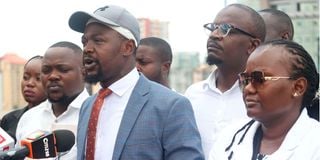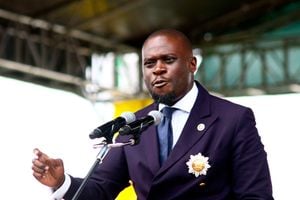Talks to end doctors' strike collapse again as boycott enters 9th day

Kenya Medical Practitioners, Pharmacists and Dentists Union Secretary General Davji Atellah addresses journalists at the union's headquarters along Kindaruma Lane in Nairobi on March 18, 2024.
Despite a gruelling seven-hour session that stretched into the wee hours of Friday morning, talks between the government and striking doctors broke down again, leaving the crippling health crisis unresolved as the strike entered its ninth day.
The closed-door meeting, which began at 5pm on Thursday, was held at the Kenyatta International Convention Centre (KICC).
After the meeting, both sides addressed the media separately reading from different scripts.
The Head of Public Service Felix Kosgey said officially there was no strike; the Kenya Medical Practitioners and Dentists Union (KMPDU) officials insisted their nationwide strike was still on.
The Employment and Labour Relations Court had on Wednesday directed the parties involved in the negotiations to end the strike and attend the Thursday meeting to alleviate the suffering of patients who are unable to access medical services, including basic and emergency services in various public hospitals across the country.
The meeting was expected to address the issues raised by KMPDU in its strike notice.
Other parties attending the talks as ordered by the court included cabinet secretaries Njuguna Ndung'u (Treasury), Moses Kuria (Public Service), Florence Bore (Labour and Social Protection) as well as representatives of the Public Service Commission (PSC), Salaries and Remuneration Commission and the Council of Governors.
Just before journalists were escorted out of the negotiating room, Mr Koskei, the convener of the meeting, made a last-ditch effort to broker peace.
He urged both sides to find an amicable solution to the ongoing strike. Linus Kariuki, the chairman of the mediation committee, then outlined the 19 key grievances that had fuelled the union's strike.
These grievances included lack of comprehensive medical cover, persistent delays in posting and paying interns, and mismanagement of the internship programme.
Budget commitment of Sh425 billion
The doctors also demanded adequate funding for the health sector, with a specific budget commitment of Sh425 billion.
Mr Koskei said: "As you know, we have been here since 5pm following the court order that we meet here with KMPDU and other stakeholders. We have had intense and cordial discussions on many issues. One thing that was very clear was that there were 19 issues that caused the strike and we went through them and agreed that they could be resolved amicably. There are some for the districts, some for the national government, some for specific hospitals."
The parties agreed to form a 13-member committee, with four representatives from the union, three from the Ministry of Health and the rest from key stakeholders such as the Council of Governors.
Over the next few days, the committee will frame the 19 issues and categorise them into either county-level concerns, national government responsibilities or specific hospitals identified by the union.
Short-term or long-term
It will also categorise the issues as either short-term or long-term.
While this was agreed by both parties, one point of contention emerged: the title 'intern'.
The government argued that pay for interns was harmonised across all professions and questioned why medical interns were paid more than their contemporaries.
"On the issue of internship, we have agreed that the term 'intern' is a bit confusing and we have that in all professions. Our friends want them to be called interns and they are paid Sh206,000 as opposed to other interns who are paid between Sh25,000 and Sh35,000 and at the same time (we) absorb all at the same time," said Mr Koskei.
"We are saying we want to harmonise payments across the board and because they passionately explained the role of an intern doctor and having realised that an intern doctor is a qualified doctor who has graduated and a doctor who does everything that is required of a doctor when he is posted, only that he is under supervision for a year, we agreed that the term intern may not be appropriate for a doctor because they are qualified and working."
The government wants the PSC to instead introduce job scales and change the name to "junior doctor or a foundation doctor so they are onboarded at entry level. We are calling them back to the table to come up with a figure that the government can afford".
Strongly disagreed
KMPDU secretary-general, Dr Davji Atellah, strongly disagreed with the recommendation.
He insists that the existing Medical Practitioners and Dentists Act already provides a clear definition of the term "intern".
“CAP253 of the Act of Parliament states that an intern is a doctor who has graduated, taken an oath, and is working under supervision. In our collective bargaining agreement, it is well defined in job group L. Changing the title does not change the work that they do at the hospitals,” he remarked.
The union says that most of the issues it has raised remain unresolved, "with no commitment".
Dr Atella said: "The CBA we are seeking is a court order from seven years ago, and the basic salary we want implemented is from 600 days ago."
The government now says that the doctors are expected to return to work today, following a court order to stop the strike, but the KMPDU is adamant that it will call off the strike once it has a return-to-work formula.
"It is very difficult when there is no commitment on the 19 issues. When we are on strike like this, we don't take promises seriously. When you have 19 issues and there's no commitment, there's no goodwill. It's like a stale cheque. But the most important thing is that we are talking," the general secretary offered.






